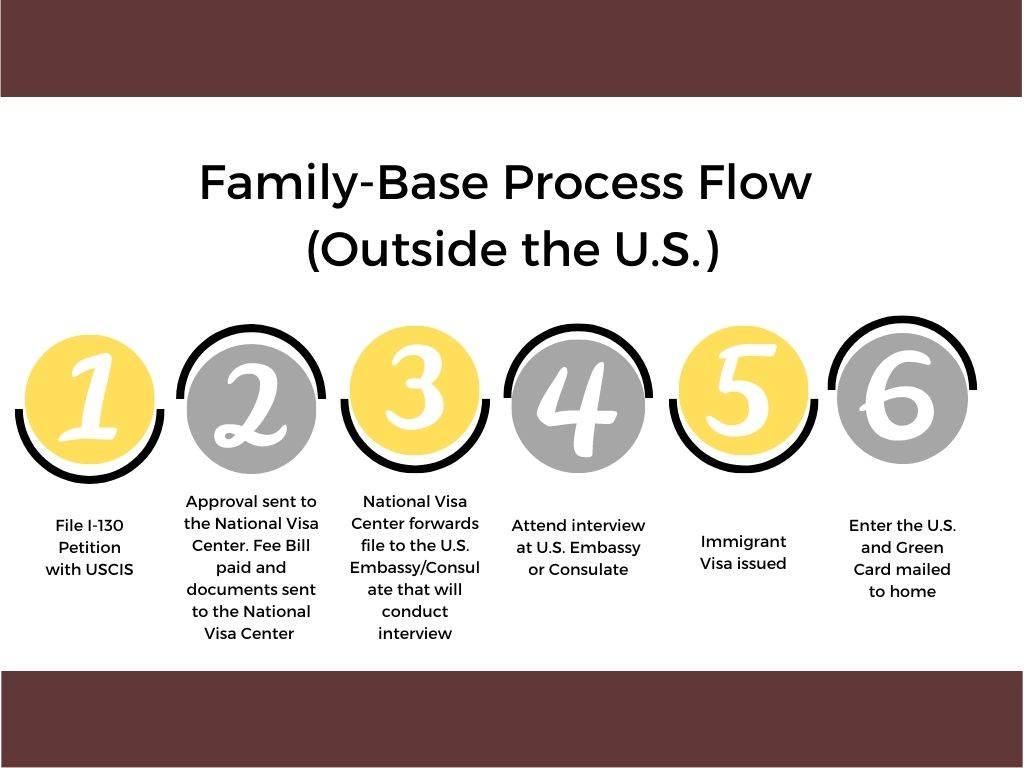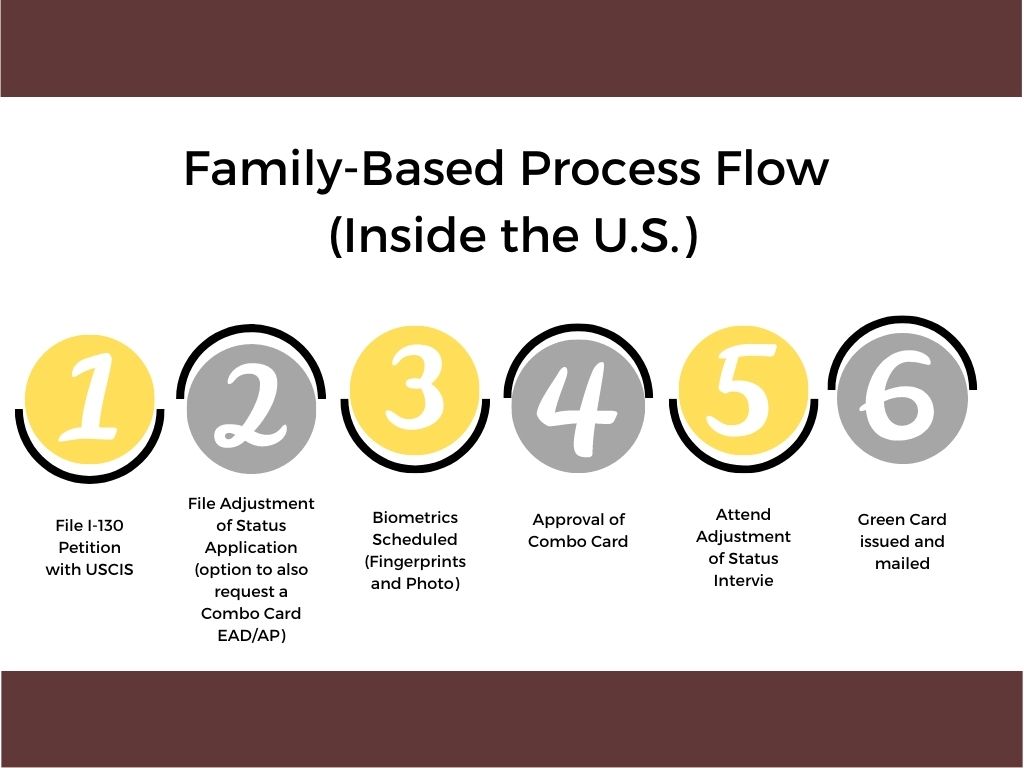Family-Based Green Card (IR, CR, F1, F2A, F2B, F3 and F4)
 U.S. immigration law allows certain foreign nationals who are family members of U.S. citizens and lawful permanent residents to become lawful permanent residents (get a Green Card) based on specific family relationships.
U.S. immigration law allows certain foreign nationals who are family members of U.S. citizens and lawful permanent residents to become lawful permanent residents (get a Green Card) based on specific family relationships.
The spouse of a U.S. citizen, the unmarried child under 21 years of age of a U.S. citizen, or, the parent of a U.S. citizen (if the U.S. citizen is 21 years of age or older) are classified as Immediate Relatives.
Other family members eligible to apply for a Green Card are classified in the following family “preference immigrant” categories:
- First preference (F1) - unmarried sons and daughters (21 years of age and older) of U.S. citizens;
- Second preference (F2A) - spouses and children (unmarried and under 21 years of age) of lawful permanent residents;
- Second preference (F2B) - unmarried sons and daughters (21 years of age and older) of lawful permanent residents;
- Third preference (F3) - married sons and daughters of U.S. citizens; and
- Fourth preference (F4) - brothers and sisters of U.S. citizens (if the U.S. citizen is 21 years of age and older).
The process for obtaining a family-based green card is composed of two phases: (1) the visa petition; and (2) the application for permanent residence.
The Visa Petition
A citizen or lawful permanent resident of the United States may file a visa petition, with U.S. Citizenship and Immigration Services (USCIS) to establish the existence of a relationship.
In this petition, USCIS will determine whether there is a relationship according to the regulations.
Affidavit of Support
Form I-864, Affidavit of Support under Section 213A of the INA, is a contract an individual signs agreeing to use their financial resources to support the intending immigrant named on the affidavit. The individual who signs the affidavit of support becomes the sponsor once the intending immigrant becomes a lawful permanent resident. The sponsor is usually the petitioner who filed an immigrant petition on behalf of the intending immigrant.
The following individuals are required by law to submit a Form I-864, Affidavit of Support completed by the petitioner to obtain an immigrant visa or adjustment of status:
- All immediate relatives of U.S. citizens (which include parents, spouses, and unmarried children under the age of 21, including orphans)
- Relatives who qualify for immigration to the United States under one of the family based preferences:
- First Preference: Unmarried, adult sons and daughters of U.S. citizens (Adult means 21 years of age or older)
- Second Preference: Spouses of permanent residents and the unmarried sons and daughters (regardless of age) of permanent residents and their unmarried children
- Third Preference: Married sons and daughters of U.S. citizens, their spouses and their unmarried minor children
- Fourth Preference: Brothers and sisters of adult U.S. citizens, their spouses and their unmarried minor children
- Employment based preference immigrants in cases only when a U.S. citizen or permanent resident relative filed the immigrant visa petition, or such relative has a significant ownership interest (5% or more) in the entity that filed the petition.
Note: An individual listed above does not need to submit an affidavit of support if they can show that they EITHER:
- Already worked 40 qualifying quarters as defined in Title II of the Social Security Act
- Can be credited with 40 qualifying quarters as defined in Title II of the Social Security Act
- Are the child of a U.S. citizen and if admitted for permanent residence on or after February 27, 2001, would automatically acquire citizenship under Section 320 of the Immigration and Nationality Act, as amended by the Child Citizenship Act of 2000
If a U.S. citizen or a permanent resident files an immigrant visa petition for his/her relative, he/she must be the sponsor. The sponsor must also be at least 18 years old and a U.S. citizen or a permanent resident. The sponsor must have a domicile in the United States or a territory or possession of the United States. Usually, this requirement means the sponsor must actually live in the United States, or a territory or possession, in order to be a sponsor. If the sponsor lives abroad, he/she may still be eligible to be a sponsor if he/she can show that your residence abroad is temporary, and that he/she still has his/her domicile in the United States.
Section 213A of the INA permits both a "joint sponsor" and a "substitute sponsor" in certain cases.
A joint sponsor is someone who is willing to accept legal responsibility for supporting the immigrant with the sponsor. A joint sponsor must meet all the same requirements as the sponsor, except the joint sponsor does not need to be related to the immigrant. The joint sponsor (or the joint sponsor and his or her household) must reach the 125% income requirement alone. A sponsor cannot combine his/her income with that of a joint sponsor to meet the income requirement.
If the visa petitioner has died after approval of the visa petition but U.S. Citizenship and Immigration Services (USCIS) decides to let the petition continue, a substitute sponsor must file a Form I-864 in place of the deceased visa petitioner. A “substitute sponsor” must be related to the intending immigrant in one of the following ways: Spouse, Parent, Mother-in-law, Father-in-law, Sibling, Child (if at least 18 years of age), Son, Daughter, Son-in-law, Daughter-in-law, Sister-in-law, Brother-in-law, Grandparent, Grandchild, and Legal guardian of the beneficiary.
A substitute sponsor must also:
- Be U.S. citizen or national or a permanent resident
- Be at least 18 years of age
- Be domiciled (live) in the United States
- Meet all of the financial requirements of a sponsor pursuant to INA 213A
The substitute sponsor assumes all of the obligations of an I-864 sponsor.
Responsibilities as a Sponsor
When the sponsor signs the affidavit of support, he/she accepts legal responsibility for financially supporting the sponsored immigrant(s), generally until they become U.S. citizens or are credited with 40 quarters of work. The sponsor’s obligation as a sponsor also ends if you or the individual sponsored dies or if the individual sponsored ceases to be a lawful permanent resident and departs the United States.
Note: Divorce does NOT end the sponsorship obligation.
If an immigrant that is sponsored receives any means-tested public benefits, the sponsor is responsible for repaying the cost of those benefits to the agency that provided them. If the sponsor does not repay the debt, the agency or the immigrant can sue the sponsor in court to get the money owed. Any joint sponsors and household members who allowed the sponsor to combine their income with the sponsor’s income to meet the minimum income requirements are also legally responsible for financially supporting the sponsored immigrant. In fact, any joint sponsor and household member is jointly or severally liable with the petitioning sponsor, meaning that the joint sponsor and household member are independently liable for the full extent of the reimbursement obligation and can be sued in court or be asked to pay the money owed, even if the petitioning sponsor is not sued or asked for money.
Income Requirements
A sponsor also must meet certain income requirements (including sponsors, joint sponsors, or substitute sponsors). A sponsor must show that his/her household income is equal to or higher than 125% of the U.S. poverty level for his/her household size. A sponsor household size includes the petitioner, his/her dependents, any relatives living with the petitioner, and the immigrants the petitioner is sponsoring.
If the sponsor is on active duty in the Armed Forces of the United States, and the immigrant he/she is sponsoring is his/her spouse or child, the sponsor’s income only needs to equal 100% of the U.S. poverty level for his/her household size.
For Poverty Guidelines for Affidavit of Support, go to: https://www.uscis.gov/forms/filing-fees/poverty-guidelines
If a sponsor cannot meet the minimum income requirements using his/her earned income, he/she has various options:
Add the cash value of his/her assets. This includes money in savings accounts, stocks, bonds, and property. To determine the amount of assets required to qualify, subtract his/her household income from the minimum income requirement. He/she must prove the cash value of his/her assets is worth five times this difference (the amount left over).
Exceptions:
- If the person being sponsored is a spouse, or son/daughter (who is 18 years or older) of a U.S. citizen: The minimum cash value of assets must be three times the difference between the sponsor’s household income and 125% of the federal poverty guide line for the household.
- If the person being sponsored is an orphan coming to the United States for adoption: The adoptive parents’ assets need to equal or exceed the difference between the household income and 125% of the federal poverty line for the household size.
A sponsor may count the income and assets of members of his/her household who are related to him/her by birth, marriage, or adoption. To use their income a sponsor must have listed them as dependents on his/her most recent federal tax return or they must have lived in the same household for the last 6 months. They must also complete a Form I-864A, Contract Between Sponsor and Household Member. If the relative a sponsor is sponsoring meets these criteria he/she may include the value of their income and assets, but the immigrant does not need to complete Form I-864A unless he or she has accompanying family members.
Application for Lawful Permanent Residence
Presuming there is no backlog for an immigrant visa for the foreign national’s country of chargeability and preference category as determined by the filing of the visa petition (i.e., priority date), if the foreign national is in the United States on a temporary nonimmigrant visa, or if he or she otherwise qualifies by regulation, the foreign national and his or her family may be eligible to apply for adjustment of status to lawful permanent resident with the regional service center of USCIS. If the foreign national is not in the United States, or does not qualify for adjustment of status, then the foreign national and his or her family must apply for immigrant visas at the appropriate U.S. consulate in his or her home country or country of residence. If permanent residence is applied for in the United States, it is called “adjustment of status” processing. If applied for outside the United States, it is called applying for an immigrant visa.” The result of either is the same: permanent residence.
As part of the ADJUSTMENT OF STATUS Application process, a foreign national may also apply for an employment authorization document (EAD) and advance parole (AP). A foreign national is not required to apply for an EAD or AP at the time he/she files his/her ADJUSTMENT OF STATUS Application or while his/her ADJUSTMENT OF STATUS Application is pending. It can take U.S. Citizenship and Immigration Services (USCIS, legacy Immigration and Naturalization Service) several months to approve a foreign national’s ADJUSTMENT OF STATUS Application. If a foreign national’s circumstances change during that time period, having the approved EAD and AP available will provide maximum flexibility even if for now a foreign national plan to continue to maintain his/her nonimmigrant status (such as H-1B, L-1, or O-1 status).
What is an EAD?
A foreign national can obtain an EAD card by filing an EAD Application at the same time he/she files his/her ADJUSTMENT OF STATUS Application, or after the ADJUSTMENT OF STATUS Application is filed. Once approved, the EAD card allows its holder to work for any employer while the card is valid. By contrast, a foreign national’s nonimmigrant status (H-1B, O-1, L-1, etc.) allow him/her to work only for the employer who filed the nonimmigrant petition. Once a foreign national has an EAD in hand, he/she may legally work for any employer. EADs are valid for up to one year at a time. Spouses and dependent children may also obtain EADs, if desired.
What is an Advance Parole?
A foreign national can obtain AP by filing an AP Application at the same time he/she files his/her ADJUSTMENT OF STATUS Application, or after the ADJUSTMENT OF STATUS Application is filed. Once approved, AP allows a foreign national to leave the United States and re-enter without having a valid nonimmigrant visa stamp in his/her passport. Unless a foreign national is maintaining H-1B or L-1 status, after his/her ADJUSTMENT OF STATUS Application is filed, a foreign national must obtain AP before leaving the United States. For example, if a foreign national has O-1 status and he/she files an ADJUSTMENT OF STATUS Application and then later a he/she leaves the United States without AP, his/her ADJUSTMENT OF STATUS Application will be considered by USCIS to have been “abandoned” and will be denied. This would cause great delay and expense because it could take weeks or months to get a foreign national back to the United States in new O-1 status, and then a new ADJUSTMENT OF STATUS Application package would have to be filed all over again. Traveling with AP prevents such problems from occurring. AP is valid for multiple entries during the validity of the document.
At the lawful permanent residence application stage, the USCIS (or consular office) will ask whether the foreign national has: (1) been a member of the Communist Party, terrorist groups, or similar organizations; (2) been arrested or convicted of any crimes; (3) ever received public assistance, (4) lied to obtain a visa, (5) worked in the United States without permission, or (6) overstayed your legal status, etc. We will go into more detail about these factors later.
In general, employment-based and family-based adjustment of status cases are subject to interviews with the local USCIS district office. Individuals who undergo consular processing of employment-based or family-based cases are also required to attend an interview.
At the end of this step, you will be granted permanent residence and issued a “green card.”


